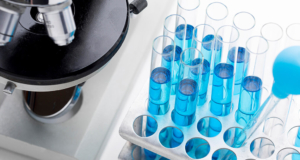About the Department & the Subject
 Clinical Biochemistry plays a critical role in the diagnosis and management of a wide range of medical conditions. Some of the common tests performed by Clinical Biochemists include liver and kidney function tests, lipid profile, electrolyte levels, hormone levels, and markers for various diseases such as cancer and heart disease. These tests help in the early detection of diseases, monitoring disease progression, and assessing the effectiveness of treatment.
Clinical Biochemistry plays a critical role in the diagnosis and management of a wide range of medical conditions. Some of the common tests performed by Clinical Biochemists include liver and kidney function tests, lipid profile, electrolyte levels, hormone levels, and markers for various diseases such as cancer and heart disease. These tests help in the early detection of diseases, monitoring disease progression, and assessing the effectiveness of treatment.
In addition to diagnosis and monitoring, Clinical Biochemists also play a crucial role in research and development of new diagnostic tests and treatments. They collaborate with other healthcare professionals, including physicians, nurses, pharmacists, and laboratory technologists, to ensure the best possible care for patients.
The field of Clinical Biochemistry is constantly evolving, with new technologies and techniques being developed all the time. With the increasing use of personalized medicine and precision medicine, Clinical Biochemists will continue to play a crucial role in providing accurate and timely diagnostic information to healthcare professionals, and helping to tailor treatments to the individual needs of patients.
Vision
The vision of Clinical Biochemistry is to improve the understanding, diagnosis, and treatment of diseases through the study of biochemical processes and markers in body fluids. The ultimate goal is to enhance patient care and outcomes by providing accurate and timely diagnostic information to physicians and other healthcare professionals.
To achieve this vision, Clinical Biochemistry aims to advance our understanding of the biochemistry of normal and diseased states, develop new and innovative diagnostic tests, and improve the accuracy and reliability of existing tests. The field also seeks to promote collaboration between laboratory professionals, clinicians, and researchers to facilitate the translation of laboratory findings into clinical practice.
In addition to improving patient care, Clinical Biochemistry also aims to contribute to the broader scientific community by generating new knowledge and insights into the mechanisms of disease. This includes investigating the roles of various biochemical markers in disease progression, identifying new targets for drug development, and developing new therapies based on a better understanding of the underlying biochemical processes.
Mission
The mission of Clinical Biochemistry is to utilize the principles and techniques of biochemistry to advance the diagnosis, management, and treatment of human diseases. This involves the use of laboratory-based diagnostic tests to measure the levels of various biochemical markers in body fluids, as well as the interpretation and application of these test results in a clinical context.
The field of Clinical Biochemistry has a number of key objectives that support this mission, including:
- Developing and validating accurate and reliable laboratory tests for the diagnosis and monitoring of diseases.
- Investigating the biochemical processes underlying various diseases and using this knowledge to develop new diagnostic and therapeutic approaches.
- Collaborating with clinicians and other healthcare professionals to ensure that laboratory test results are effectively integrated into patient care.
- Providing education and training to laboratory professionals and clinicians to ensure that they have the knowledge and skills necessary to effectively utilize laboratory-based diagnostic tests.
- Contributing to the advancement of scientific knowledge in the field of biochemistry and its application to human health.
Faculty
| NAME | QUALIFICATION | DESIGNATION | CONTACT | MORE |
|---|---|---|---|---|
| Dr. Gh Jeelani Mir | PhD | Assistant professor (HOD) | +918491823625 [email protected] [email protected] | Detailed CV |
